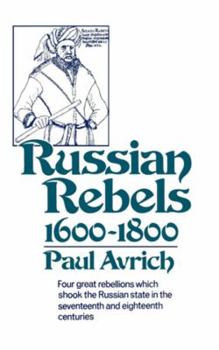Russian Rebels, 1600-1800
Select Format
Select Condition 
Book Overview
The aim of this book is to unravel the tangled story of the four revolts, to examine their nature, course, and outcome, and to analyze their ultimate historical significance. Who were the rebels? What were their motives, social origins, and modes of behavior? What did they want and what did they achieve? Such are the questions this work will try to answer. Comparisons between the revolts will be made throughout the text, and especially in the concluding...
Format:Paperback
Language:English
ISBN:0393008363
ISBN13:9780393008364
Release Date:November 1976
Publisher:W. W. Norton & Company
Length:324 Pages
Weight:0.71 lbs.
Dimensions:0.8" x 5.0" x 8.2"
Related Subjects
Biographical Biographies Biographies & History Biography & History Europe History Russia WorldCustomer Reviews
2 ratings
Great insight into the Russian psyche
Published by Thriftbooks.com User , 16 years ago
Bolotnikov, Razin, Bulavin and Pugachev are all names lost to history yet these were leaders of four extrodanary revolutions which rocked Russia between 1600 and 1800. These revolts were largly ignored by historians because, at the times when they happened they caused panic among the Russian ruling classes. All four were revolts of common people, peasants, townspeople, Cossaks, low ranking priests and monks, and common soldiers. Indeed the story of these rebellions is the story of the Russian underclass, the "dark people" whole lives are ignored by historians. In this narrative we learn about Russian peasants were enslaved by great Russians starting with Ivan the Terrible. Later a Cossak revolutionary named Stenka Razin leads a revolt against unpopular religious reforms and the state of serfdom. Another Cossak leader Bulavin leads a rebellion against Peter "the Great," whose sought to build a western style state at the expense of common Russians. Finally we are told about the bloodiest revolt of all, Emelian Pugachev who declaired himself to be the murdered Czar, Peter III and brough terror to the regeim of Czarina Caterine "the Great," an "enlightened" ruler whose reforms stopped short of benifiting the great masses of Russian people. In each revolt, the methods used were often cruel. But also in each the repression of the rebellions was equally severe. They were all acts of desperation by desperate people. Often the rebels were comprised of ignorant peasants who sought to free themselves from the oppression of severe rulers. The author, Paul Avrich neither approves nor condemns the actions taken by the revolutionary leaders. Rather he explains in graphic detail the causes of the conflicts, the courses of events and gives an analysis of the importance of each of these four events in Russian history. Avrich then ties in the rebellions of this book with later revolutionary movements, the Decemberist rebels, the Nihilist-Anarchist movements of the 1860s and even the Bolshivik movement. All the same he makes it clear that the rebellions in question were attempts to go back in history to times of simplicity when an agrarian based peasant economy existed with free peasants worked and lived lives of simplicity. This would make these rebellions seperate from western influenced revolutionary activities of later generations, which were led by members of the intellegencia.
Brian Wayne Wells, <i>Esquire</i>, reviews "Russian Rebels"
Published by Thriftbooks.com User , 26 years ago
This is an exceptional little book which tells the story of the four largest peasant revolts in Russian history all of which were named for the leaders who inspired the revolts--Bolotnikov in 1606-1607, Razin in 1670-1671, Bulavin in 1707-1708, and Pugachev in 1773-1774. Readers have always wondered why Russia has traditionally felt the need for a strong authoritarian central government. This book answers that question in part. The huge Russian empire was made up of many different ethnic groups. Ethnic jealousies, resulting in civil wars and foreign invasions were always the result of a weak Czar or a change of dynasty. Thus the social compact of the Russian state was that all groups must submit to the power of a Czar in order to survive. This is the reason for the god-like status and supreme power given to the Czar in the old Russian empire.





